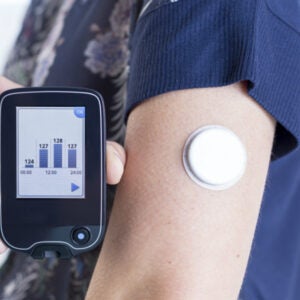
The Down’s Syndrome Association has won a £141,000 government grant for an app that helps disabled people keep active, eat healthily and lose weight.
The charity’s DSActive programme, which encourages activity among people with Down’s syndrome, has created the Health Swap nutrition app to help combat obesity.
It’s now been selected as one of three initiatives to receive a share of the Department for Digital, Culture, Media and Sport (DCMS)’s £400,000 Digital Inclusion Fund – which aims to improve elderly and disabled people’s lives through technology.
DSActive project manager Alex Rawle said: “Although there are many great apps for people with disabilities, from speaking with people with Downs’ syndrome, we found that many of them were not entirely suitable for their needs.
“Technology is an important part of modern life, and this is no different for people with Down’s syndrome.
“Many people with Down’s syndrome struggle with managing their weight, this app will help them make positive changes to their nutrition and lead a healthier lifestyle.”
Development of the nutrition app by the Down’s Syndrome Association
The Down’s Syndrome Association claims Health Swap will be the first of its kind to be specifically designed for those with Down’s syndrome.
Alongside its health benefits, it aims to connect people with a wider community of users to help combat loneliness.
People with Down’s syndrome will be directly involved in developing the technology.
Mr Rawle said: “People with Down’s syndrome will be consulted at all points within the development of this app to ensure that it is specifically designed to suit their needs.
“We will also draw upon the experience of staff and professionals who work for and with the Down’s Syndrome Association, many of whom are leading experts in their fields.
“We will be recruiting people with Down’s syndrome from all corners of England to trial the app, and all of them will be supported by the DSActive staff to use it.”
Mr Rawle said the 49-year-old association was aiming to change misconceptions in society about the abilities of people with Down’s syndrome.
He added: “As society becomes more inclusive, there will be more opportunities for people with Down’s syndrome to reach their potential in all aspects of life, including sport, education and employment.”
Why is the Down’s Syndrome Association’s Health Swap app needed?
The most common condition for people with Down’s syndrome is an under-active thyroid, which is known as hypothyroidism.
Symptoms of this condition include lack of concentration, weight gain and memory loss.
The Health Swap app aims to help people with Down’s syndrome to monitor their weight and exercise levels from their smartphones.
It will give them the chance to take charge of their health, as more than 70% of people with the condition are considered overweight or obese.
Other Digital Inclusion Fund projects include smart homes for elderly
The Health Swap app is one of three projects that support vulnerable groups to be backed by the Digital Inclusion Fund – also including “smart homes” for digitally upskilling elderly people and video consultations in palliative care.
A small number of homes will be converted in to smart homes in West Sussex by a partnership led by Uttlesford Council for Voluntary Service.
This will involve elderly people becoming trained by younger “digital buddies” to become “digital boomers”.
They will receive a digital assessment, before having their homes equipped with the latest tech.
Following this, the newly-crowned experts will then open their homes for other elderly people to visit and learn first-hand how to make the most of smart technology by incorporating it in to their daily lives.
This will include operating household appliances, booking GP appointments online, contacting friends and family by video, and shopping online.
Video consultations in palliative care
The fund is also being used to facilitate the Weldmar Hospicecare Trust in Dorchester, Dorset, to use technology and skills to help end-of-life and palliative patients.
The project will expand technology for users to update daily about their health, as well as having remote consultations with doctors via video in a timely and cost-effective way.
The Trust will initially conduct a research project to find out the most inclusive way to use tele-health technology for its patients.
Research from Lloyd’s Consumer Digital Index 2018 highlighted elderly and disabled people as being the slowest to adopt basic digital skills, and also have the lowest internet usage.



